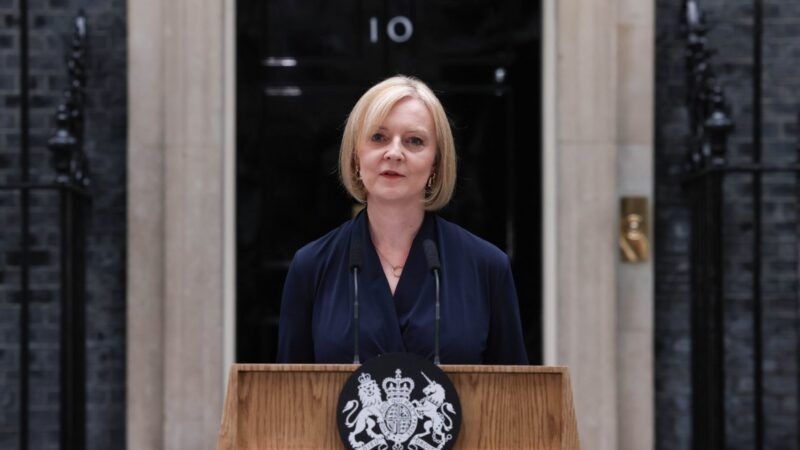U.K.’s New Prime Minister Targets Aggressive Food Nannies (original) (raw)
Liz Truss seeks to possibly end ill-advised bans on advertising and special deals on foods experts deem “unhealthy.”
| 9.14.2022 3:05 PM

U.K. Prime Minister Liz Truss (EyePress News/EYEPRESS/Newscom)
Good news in England for people who like good food: New Prime Minister Liz Truss' administration is taking aim at the country's overly oppressive attempts to regulate what people eat.
Health experts in the United Kingdom say it has a massive obesity problem, with around two-thirds of Brits classified as overweight. And because England has socialized health care, everybody is responsible for paying the additional medical expenses that may come from treating those who are obese, which the National Health Service (NHS) calculates at more than 6 billion pounds a year (almost $7 billion).
For the past five years, U.K. officials have attempted to address the problem by blaming just about everybody except those who overeat—advertisers, supermarkets, restaurants—and putting into place very broad, very strict regulations to fight junk food, or at least what the government defines as junk food. Advertising bans on junk food have been written so broadly that they also affect foods like cheese, butter, and olive oil. London introduced a ban on junk food ads so far-reaching that the government had to change ads on its transit systems because they included images of forbidden foods like strawberries and cream.
As the COVID-19 pandemic hit, U.K. health officials used it to crank up the nanny state regulations even further. In 2020, the government announced additional bans on junk food advertising, new rules on where unhealthy foods could be displayed in markets, and a prohibition on two-for-one deals featuring foods the government has decided are unhealthy.
Then the inflation and supply shortages got worse. Then-Prime Minister Boris Johnson decided in May to delay the bans. Deliberately driving up food prices amid a supply and inflation crisis did seem like a bad idea, but health officials were furious that he didn't follow through.
Truss might look to scrap the nanny food campaign entirely, supported by her health secretary and Deputy Prime Minister Thérèse Coffey. Via The Guardian:
Truss pledged during the Tory leadership campaign to light a bonfire of obesity rules if she won. "Those taxes are over. Talking about whether or not somebody should buy a two-for-one offer? No. There is definitely enough of that," she told the Daily Mail last month.
"What people want the government to be doing is delivering good roads, good rail services, making sure there's broadband, making sure there's mobile phone coverage, cutting the NHS waiting lists, helping people get a [doctor's] appointment. They don't want the government telling them what to eat", she added.
Reason noted the absurdity of the ban on discounting food when it was announced in 2020. Health officials claimed the sales caused people to "buy more food than they need." But people always need food, and the food they didn't eat at purchase can be saved for later. It was a bizarre and privileged policy authored by people who seemingly haven't had to budget for meals or time.
The Guardian noted back in May when Johnson delayed the plans to ban daytime junk food ads that it would also have cost broadcast networks in the U.K. more than 200 million pounds a year ($230 million) in lost revenue.
Truss was promising to scrap these rules back in August if she became prime minister. And in 2019 when she was a member of Parliament for South West Norfolk, she was already criticizing these types of approaches to deal with health issues:
The assumption is that society is a machine where levers can be pulled, the handle can be cranked, and better results will ensue. So, there are calls to regulate or ban foods too high in sugar or fat, to reduce obesity. … But people aren't machines — they are agents of their own destiny. In Scotland, alcohol consumption has gone up despite the introduction of the minimum alcohol price. Years of focusing on low-fat diets didn't work. Butter is enjoying a resurgence, after it turned out margarine wasn't a healthier choice after all. Over the long term, it is free societies, where people are able to lead their own lives, that have better results in terms of health, the environment, and life expectancy. Rather than trying to micromanage people's lives, we should focus on breaking down barriers to success whilst allowing us all the freedom to make our own choices
So let's appreciate Truss approaching the obesity crisis by encouraging free market solutions rather than government controls. She should consider a similar approach for the country's energy issues rather than attempting to freeze energy bills and risk the possibility of blackouts and/or rationing.
NEXT: Lindsey Graham's Abortion Ban, Which Would Override State Laws, Shows Contempt for Federalism
Food FreedomEnglandUnited KingdomFood PolicyObesityNanny StateAdvertisingFoodFast FoodPublic Health